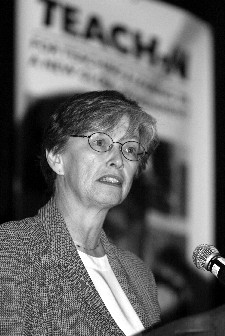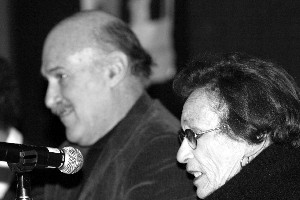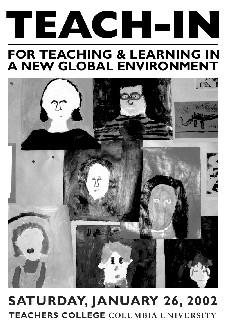TC Teach-In: Helping Educators Respond to 9/11
Since September 11, 2001, New York City teachers, principals, superintendents, and even parents have been looking to Teachers College for answers on how to respond to the terrible events of that day.
Many TC faculty members have been responding to questions and concerns individually. But, the College wanted to do more to reach out to the community to provide help, ideas, and answers. On January 26, the Teach-In for Teaching and Learning in a New Global Environment was held at Teachers College. More than 500 tri-state educators, parents and graduate students who attended that day. New teachers from New York and New Jersey were authorized to receive New Teacher Credit by their districts for attending the event.
Professor Jim Borland, one of the organizers of the Teach-In, welcomed the group and introduced President Arthur Levine who thanked the teachers and students for giving up their Saturday morning to attend before introducing the first keynote speaker, Carol Bellamy.
Bellamy, who is currently Executive Director of the United Nations Children's Fund (UNICEF) had just returned to the United States from Kabul, Afghanistan.
Bellamy reminded the audience, "We have power to build a better world for and with our children. In serving their best interests, we serve all humanity.
New York City Public Schools Chancellor Harold Levy talked about how many teachers rose above their routines on the day of the attacks, including some teachers who were only in the fifth day of their careers.
He recounted the story of one teacher who led her students to safety by putting them on ferries to Staten Island and Jersey City and then walked to Brooklyn to tell Levy what she had done because the telephones were not working. All the time she was doing this, that teacher was aware that her own sister was in one of the Towers, never to be heard from again.
The third keynote came from Stacey Fell-Eisenkraft, a full-time teacher and staff developer at Dr. Sun Yat Sen Middle School 131 in Chinatown. Fell-Eisenkraft is an Ed.D. student in the department of Curriculum and Teaching at TC. She brought five students from her 8th grade class to give an account of their experiences on and since September 11th.
Fell-Eisenkraft told how many of the students at the school saw the planes crash into the towers and saw people jumping from the upper floors. "Thousands of dusty business people walked past the school and students wondered if it was safe to stay in Chinatown when so many people were leaving," she said, adding that she did not know what to tell them.
One by one the five students recounted the effects on their day-to-day lives-from the inability of their parents to work because their companies could not do business without access to passable roads; to the lack of customers in restaurants where one boy's father was a waiter, forcing each of the serving staff to invest $500 in the business to avoid the restaurant's closing. One girl, who did not speak English well and had not lived in New York very long, spoke of how easily she gets lost without having the Twin Towers to refer to for direction and not being able to understand the street signs well enough to find her way home.
Following the keynote presentation, three workshop sessions offered participants a choice of more than 50 workshops covering topics ranging from curriculum design to the effects of the attacks on young people, to understanding Islam, to human rights education.
In a workshop entitled The New Constellation of Forces in the Middle East After 9/11, Gary Sick, who was a member of former President Carter's National Security Council discussed the Al-Qaeda, the terrorist network organized by Osama bin Laden, as a group that feeds off states where the central government is in disarray. Unlike terrorist groups spawned by nation states, the Al-Qaeda encourages members of the organization to take their own initiative rather than receiving direct orders from a leader.
A highlight of the workshop sessions was an interactive video forum that facilitated a conversation between a group of about 30 New York City teachers and another group of 20 teachers from Phoenix, Arizona.
The final session featured a panel discussion on Civil Liberties and Human Rights During War Time. Moderated by TC's Vice President for Academic Affairs and Dean Darlyne Bailey, panelists included Maxine Greene, Ira Glasser, Anne Nelson and Norman Siegel.
Citing examples throughout history, Glasser, former Executive Director of the American Civil Liberties Union (ACLU), spoke of the repeated passage and revocation of laws that, he said, targeted people who were unpopular in an effort to make citizens feel safe. Without real evidence, he said, "you violate the rights of innocent people and you don't make anyone safer."
Anne Nelson, Director of the International Program at Columbia's Graduate School of Journalism, spoke of the difficulties of reporting on the actions of the United States in foreign countries when many in the world view our policies as being a double standard.
Greene spoke of the tenets of the Declaration of Independence affording all human beings certain inalienable rights.
"Human rights are the fruit of communication and people coming together in community and coming to agreements with one another and making a pact with one another," Greene said. This approach can be nurtured in the classroom by promising that "Membership [in a community] comes before individuality," she explained.
Norman Siegel, former Executive Director of the New York Civil Liberties Union (NYCLU) commented, "The government's detaining of people for questioning along with racial profiling has happened before in America, and it is happening today. People of good will begin to rationalize and minimize the painful reality when the government is trampling on people's rights and it is not their rights," he said. "History will judge us and how we reacted to the government's reactions. Did we question them, challenge them? Did we speak up?"
The day ended with musical entertainment by Quraishi, an Afghan Rebob player, whose music was representative of folk, classical and modern Afghan compositions. Quraishi is a native of Kabul.
Published Friday, Jan. 7, 2005



